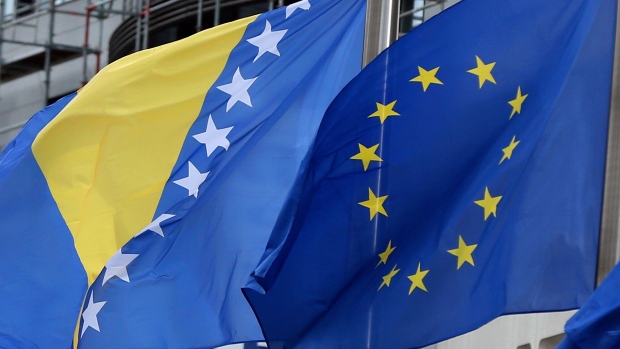Mar 21, 2024
EU Agrees to Start Talks With Bosnia in Latest Enlargement Push
, Bloomberg News

(Bloomberg) -- European Union leaders agreed to open membership talks with Bosnia-Herzegovina as the bloc seeks to pull a divided Western Balkan country closer into its orbit to counter growing Russian influence.
The move is a win for a nation still fragmented since the Balkan wars of the 1990s that followed the collapse of Yugoslavia. It’s the latest sign that the EU is trying to revive a stalled enlargement process as it faces Moscow’s war-making in Ukraine and an encroaching China.
“It wasn’t easy to reach consensus,” Croatian Prime Minister Andrej Plenkovic told reporters at the summit meeting in Brussels late Thursday. “But this decision is crucial for Bosnia’s existence and its territorial integrity.”
Bosnia comprises of two antagonistic entities, Serb-dominated Republika Srpska and a Muslim-Croat federation, linked by a weak central government in Sarajevo. Serb leader Milorad Dodik, who counts Russian President Vladimir Putin as an ally, has long threatened to secede from the rest of the country and has opposed membership in the North Atlantic Treaty Organization.
EU leaders pushed ahead with an effort to weaken Russian influence in Bosnia and prevent the country from breaking apart. The move comes months after EU leaders agreed to open accession talks with Ukraine and Moldova.
Bosnia applied for EU membership in 2016 and was granted candidate status last year. It joins Serbia, Montenegro, Albania, and North Macedonia, which are all at various stages of entry negotiations.
Another Western Balkan nation, Kosovo, which unilaterally broke from Serbia in 2008, is recognized as a potential EU candidate, while Russia’s neighbor Georgia was granted candidate status in November.
So far the path to becoming an EU member has been arduous, requiring the unanimous agreement among EU leaders. Croatia, the last country to join, took 10 years to push through its application before it was formally accepted in 2013.
With 27 members already, an even bigger union would force the world’s largest trading bloc to change the way it takes decisions. The EU’s executive earlier this week proposed changes to its enlargement process that put the onus on gradual integration as a way to prepare countries including Ukraine, Moldova and the Western Balkans for their membership well ahead of accession.
Against the backdrop of the Russian invasion of Ukraine and geopolitical turmoil, a message must be sent that Bosnia is part of a free Europe, Christian Schmidt, the top international envoy to the country.
“Bosnia-Herzegovina is still far from ready for EU accession,” Schmidt told Germany’s Deutschlandfunk radio on Thursday. The coming weeks, months and perhaps years will require “sweat and tears.”
--With assistance from Iain Rogers, Michael Nienaber, Alberto Nardelli and Katharina Rosskopf.
(Updates with Croatia’s prime minister in third paragraph.)
©2024 Bloomberg L.P.